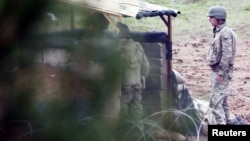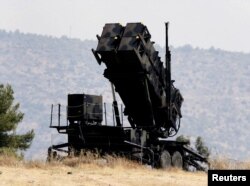ISTANBUL —
NATO is expected to make a decision Tuesday on Turkey's request for the deployment of missile defense batteries along its border with Syria. The decision is seen by Ankara as having both military and diplomatic significance. But such a deployment is strongly opposed by Russia and Iran.
NATO member Turkey has formally asked the alliance to deploy its sophisticated anti-missile Patriot defense system along the Turkish-Syrian border. Diplomatic columnist Semih Idiz for Hurriyet Daily News said the request is the result of growing concern in Ankara that an increasingly desperate Syrian government could target Turkey for its support of Syrian rebel forces.
"I think it's worried that the situation in Syria will get out of hand, and that [Syria's President] Assad may in fact, whether the warhead contains chemical weapons or not, decide to use ballistic missiles," said Idiz. "The request did come from the military wing, it (was) as much a military decision as it was a political decision."
But Ankara’s request for NATO assistance has sent alarm bells ringing among regional powers, namely Iran and Russia. Both Tehran and Moscow strongly criticized the move, accusing Ankara of being provocative.
Some analysts have suggested any deployment of the anti-missile system could be the first step to creating a no-fly zone against the Syrian air force, something Ankara has been calling for. But Turkish Prime Minister Recep Tayyip Erdogan recently said any deployment would be purely defensive.
He said no one should try to get a different meaning from the precautions Turkey takes on its border. He said Turkey is obligated to take these measures for defensive purposes only.
It remains unclear how many Patriot missile batteries NATO would deploy if it approves Ankara’s request.
With a 900-kilometer-long border, the missiles would offer only minimal protection to any sustained attack by Damascus, said Meehan Demir, defense expert and Ankara bureau chief for Star news TV channel. But Demir said any deployment would still be important.
"These missiles are just symbolic," said Demir. "These missiles are just for a kind of message to Syria, that Turkey is here and it's not alone, it is with its NATO allies."
The repercussions of such a deployment by NATO could be considerable, according to Mustafa Kibraoglu, head of the International Relations Department at Istanbul’s Okan University. He said any decision by NATO to deploy the Patriot system would mark a major change in strategic policy by the military alliance and could have consequences beyond Syria.
"With respect to the Middle East, the European allies have always been reluctant so far in terms of showing or displaying solidarity with Turkey," he said.
"But now for the first time, its European allies are not that reluctant, and seemingly even enthusiastic, at least at the governmental level. Behind the enthusiasm might not only be the conflict in Syria, the turmoil in Syria," Kibraoglu added. "Because thinking about some contingencies, that may involve Israel and Iran. Because of Iran's nuclear program and Israel's threats to Iranian nuclear facilities."
Kibraoglu suggested any deployment of NATO missiles in Turkey could last years.
It would not be the first time NATO has sent Patriot missiles to Turkey. During the first Gulf War, batteries were placed along the Iraqi frontier. But observers said if NATO does agree to Ankara’s latest request, the deployment could herald a significant change in the alliance's strategy towards the region.
NATO member Turkey has formally asked the alliance to deploy its sophisticated anti-missile Patriot defense system along the Turkish-Syrian border. Diplomatic columnist Semih Idiz for Hurriyet Daily News said the request is the result of growing concern in Ankara that an increasingly desperate Syrian government could target Turkey for its support of Syrian rebel forces.
"I think it's worried that the situation in Syria will get out of hand, and that [Syria's President] Assad may in fact, whether the warhead contains chemical weapons or not, decide to use ballistic missiles," said Idiz. "The request did come from the military wing, it (was) as much a military decision as it was a political decision."
But Ankara’s request for NATO assistance has sent alarm bells ringing among regional powers, namely Iran and Russia. Both Tehran and Moscow strongly criticized the move, accusing Ankara of being provocative.
Some analysts have suggested any deployment of the anti-missile system could be the first step to creating a no-fly zone against the Syrian air force, something Ankara has been calling for. But Turkish Prime Minister Recep Tayyip Erdogan recently said any deployment would be purely defensive.
He said no one should try to get a different meaning from the precautions Turkey takes on its border. He said Turkey is obligated to take these measures for defensive purposes only.
It remains unclear how many Patriot missile batteries NATO would deploy if it approves Ankara’s request.
With a 900-kilometer-long border, the missiles would offer only minimal protection to any sustained attack by Damascus, said Meehan Demir, defense expert and Ankara bureau chief for Star news TV channel. But Demir said any deployment would still be important.
"These missiles are just symbolic," said Demir. "These missiles are just for a kind of message to Syria, that Turkey is here and it's not alone, it is with its NATO allies."
The repercussions of such a deployment by NATO could be considerable, according to Mustafa Kibraoglu, head of the International Relations Department at Istanbul’s Okan University. He said any decision by NATO to deploy the Patriot system would mark a major change in strategic policy by the military alliance and could have consequences beyond Syria.
"With respect to the Middle East, the European allies have always been reluctant so far in terms of showing or displaying solidarity with Turkey," he said.
"But now for the first time, its European allies are not that reluctant, and seemingly even enthusiastic, at least at the governmental level. Behind the enthusiasm might not only be the conflict in Syria, the turmoil in Syria," Kibraoglu added. "Because thinking about some contingencies, that may involve Israel and Iran. Because of Iran's nuclear program and Israel's threats to Iranian nuclear facilities."
Kibraoglu suggested any deployment of NATO missiles in Turkey could last years.
It would not be the first time NATO has sent Patriot missiles to Turkey. During the first Gulf War, batteries were placed along the Iraqi frontier. But observers said if NATO does agree to Ankara’s latest request, the deployment could herald a significant change in the alliance's strategy towards the region.





